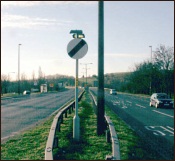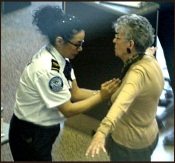Sleeping with Leviathan
 The stretch of the A647 between Bradford and Leeds is a speed camera trap. At first, the signs are clear: the white circle with a thick black line struck through it tell the driver that the national speed limit applies and all’s well. On a late spring day, provided one leaves early enough, this portion of the journey can be almost pleasant. After a few miles, the signs then change to indicate a maximum speed of 60: this isn’t too bad, just a lighter application of the gas pedal is sufficient to ensure compliance. Two speed cameras go by. Then there is a more sudden drop to 40, which is located around a bend: the sign is followed on shortly by yet another camera.
The stretch of the A647 between Bradford and Leeds is a speed camera trap. At first, the signs are clear: the white circle with a thick black line struck through it tell the driver that the national speed limit applies and all’s well. On a late spring day, provided one leaves early enough, this portion of the journey can be almost pleasant. After a few miles, the signs then change to indicate a maximum speed of 60: this isn’t too bad, just a lighter application of the gas pedal is sufficient to ensure compliance. Two speed cameras go by. Then there is a more sudden drop to 40, which is located around a bend: the sign is followed on shortly by yet another camera.
I’m a careful driver and always have been: I earned my license in 1994. Hitherto, I have never been issued with a speeding ticket; however, this last trap caught me. One morning, I headed around the bend with another car not too far behind me. I applied the brakes, but given the proximity of the other driver, I knew that if I pushed it too hard, I might risk him bumping into my rear. The Bach flowing through the car radio perhaps encouraged me to be a bit more relaxed than I should have been: the speedometer did go down, just too slowly. I passed the camera. I caught the glimpse of a flash in my rear view mirror: I knew I’d been nailed. I fretted the rest of the way to the office.
A few days later, I received a rather severely worded notice of intended prosecution; as it turned out, I’d been recorded going 47 miles per hour. I suppose I could have fought it somehow, but I don’t have a great deal of time to devote to such things nor am I Chris Huhne: besides, Kirklees Council’s enclosed brochure stated that they wanted to “inform, not to punish”, so they offered me another option. If I attended a driving course, then no penalty points would be accrued. The course cost £75 and I’ll be giving up part of a weekend to do it; I repeat, I have been driving for nearly 20 years and yet never had a speeding ticket before this one. Inform, not punish? Pull the other one: I now approach this particular bend with trepidation. I always make sure I slow down to below 40 before getting near the camera; I am certain that more carefree drivers behind me are perplexed by what I’m doing. Because of this incident, I watch the speedometer quite closely: I don’t believe this is particularly helpful, as my driving style up until now has been more focused on knowing the relative positions of other cars. Inform, not punish? You could have fooled me: the reactions of myself and other drivers who slow to a crawl around this curve are precisely because we’re fearful of punishment. There seems to be no flexibility in how the council approaches matters; if you’re over the limit, even marginally, and even if it may be unsafe to go more slowly, it doesn’t matter: you’re busted.
The state can be a Leviathan, pushing and bullying its way into the most intimate corners of a citizen’s life; it can also be clumsy, corrupt and often times it can be a perfect idiot. However, there is a new trend, perhaps due to the harsher atmosphere created by austerity: the state seems to regard the citizens who sustain it with disdain, almost contempt. One gets the impression from some portions of government that they would be happier if they didn’t have to serve anyone ever again: the only exceptions arise when they can charge a fee or collect more taxes. But if one wants the public services that are supposed to come from having paid through the nose, it’s a trial. In response, citizens understandably fear and despise the state.
A case which was described in Monday’s edition of the Liverpool Echo provides a pertinent example: a girl named Poppy Young wrote a letter to David Cameron, saying “I hate the government for what it has done” to her mother. Her mother Wendy, who is disabled and often bed-bound, had been deemed “fit for work” and taken off of disability benefit: this is a very odd conclusion given that the last time she attempted to go out on her own, she apparently fractured her skull. Despite this, two appeals were dismissed. It was only after more pressure and public embarassment was brought to bear did the government relent. Nevertheless, Mrs. Young will be compelled to attend a “work-related activity group” in order to continue to receive her benefit.
Examine the subtext: the agents of the state simply didn’t care that Mrs. Young was obviously disabled. They somehow looked past her infirmity and adhered to the government’s main priority: save money. It doesn’t matter who gets steamrolled by this, just do it: the common good is only ensured by achieving a perfectly balanced ledger. Let compassion, duty, responsibility and even sense be left aside, all that matters is cost projections, financial targets, and at the end of the day, pleasing the bond markets. Never mind that it was the avatars of finance who rule the bond markets which created the bubble and the subsequent recession in the first place; I suggest if Mrs. Young was the CEO of a large bank and able bodied, should she have required the assistance of the state, she would have found it had much fewer strings attached. After all, a bank is too big to fail: a disabled woman is far too small to save.
 It would be wrong to suggest that this kind of nastiness is solely a British phenomenon. As anyone who travels to the United States these days knows, entering the country can be an extremely unpleasant experience. I am aware of a harmless looking white haired woman in her late 60’s with mobility problems who was once asked by American border officials if she was visiting the country for nefarious purposes, namely to earn income as a prostitute. This is the same country that was initially willing to let George Zimmerman off the hook for brutally murdering Trayvon Martin, and only reversed course after relentless public outrage. It is also the same country whose House of Representatives recently passed a heavily modified Violence Against Women act, which could potentially roll back protections for illegal immigrants, transgender and gay people.
It would be wrong to suggest that this kind of nastiness is solely a British phenomenon. As anyone who travels to the United States these days knows, entering the country can be an extremely unpleasant experience. I am aware of a harmless looking white haired woman in her late 60’s with mobility problems who was once asked by American border officials if she was visiting the country for nefarious purposes, namely to earn income as a prostitute. This is the same country that was initially willing to let George Zimmerman off the hook for brutally murdering Trayvon Martin, and only reversed course after relentless public outrage. It is also the same country whose House of Representatives recently passed a heavily modified Violence Against Women act, which could potentially roll back protections for illegal immigrants, transgender and gay people.
What are the messages, what are the symbols, what meanings should we derive? John F. Kennedy said in his inaugural address “Ask not what your country can do for you, ask what you can do for your country.” However, we’re beyond being asked: shut up, pay, work harder, pay some more, do as you’re told. Take off your shoes in airports; sorry, Granny, get out of that wheelchair, oh and by the way, are you here because you’re a whore? Sorry madam, because you can actually move, albeit not far without falling and hurting yourself, get out of your sickbed and work: we’re slashing your benefit. It’s OK, George, you can shoot that kid because he looked suspicious and God knows what he would have done with that bottle of iced tea and bag of Skittles. Hey you, Mr. Motorist, deviate slightly from the limit, no matter how safe or unsafe it is, you’ll be forced to pay up and we’ll slap on some penalty points, or alternatively, you can pay more than the cost of the fine to attend a course to be lectured to as if you’re consistently reckless. It is no wonder that some people in America retreat to the wilds of Montana in order to escape the surly bonds of typical society. It’s no surprise that people in Britain vote for whatever viable opposition they can find in order to deliver a good kicking to the government of the day. “I hate the government,” Poppy Young wrote; she spoke for more than she knew.
Nevertheless, a certain amount of disdain is good, even healthy: it means that if the government comes up with nonsense, totalitarian or otherwise, citizens instinctively resist it. It also implies that authority is neither trusted nor revered: this is another rampart of liberty. It can tip over, however: the gap can grow to the point where people want to remove themselves from the political process and surrender to despair. We passed this milestone a while ago: genuine harm is being done to both society and democracy. It would be tempting to say that change will come as a result, but those who take to the streets and raise their voices in protest are a distinct minority. Many people believe that Leviathan’s stumblings and fumblings and gropings and graspings are now inevitable, and they have to merely live with it, tune in the football or comedy on the television for light relief, have a beer with their mates on the weekends to drown out the impulse to think. They sleep as Leviathan rages. They slumber as it derides and devastates. Wake up? What for?


